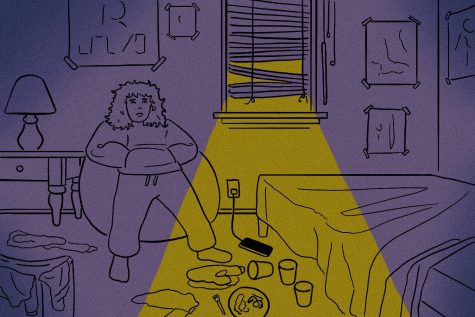Column: Being diagnosed with depression in my twenties
November 11, 2021

Editor’s Note: The following article contains references to the subjects of suicide and suicidal thoughts, which may cause discomfort for some readers.
A month ago, my therapist diagnosed me with depression. I had recently started to lose interest in the things I loved and began having intrusive thoughts. It was something I tried not to think about and thought that I was just sad and lazy because of the stigmas surrounding mental health.
When I was crossing the street and a car rushed in front of me, almost touching my nose, my only thought was, “If I go today, this doesn’t sound too bad.”
I do not harm myself or plan to end my life, but I have been experiencing passive suicidal ideation, a term for intrusive thoughts about suicide.
Matthew Teeters, a therapist at Depth Counseling, said when people experience passive suicidal ideation, they need to listen to their body that in a sense tells them to escape a feeling or situation. A person needs to identify what makes them feel trapped.
According to the Centers for Disease Control and Prevention, 21% of adults 18 to 29 years old experienced symptoms of depression in 2019, the highest rate of any age group.
Teeters worked as an intern at Columbia’s Counseling Services in 2020 and said a majority of students who sought help were suffering from depression or anxiety. He said major signs of depression are loss of appetite, lack of energy, difficulty sleeping, fatigue and body pains without reason.
If you are suffering from depression or any other mental health concerns on campus, Counseling Services provides up to 12 individual counseling sessions through the academic year that are already included in each student’s tuition. There are also unlimited group counseling services students can sign up for.
Teeters said it is important to know the difference between major depressive disorder, or clinical depression, which is a disorder that can debilitate a person but is treatable with medication and attention from mental health professionals, and depression as a symptom. In the second case, depression can refer to a “low mood” and is related to a different issue in a person’s life.
I’ve been going to therapy for three years, and it has helped me to grow as a person. Without my therapist, I would have never known that I have depression. I knew the signs of it, but I was gaslighting myself into thinking I was just sad for a long time — “I’m just lazy, and that is why I cannot meet the deadline. That is why I have a pile of dishes near my bed. That is why I can not get out of bed.”
But there was also a fear of the stigma around depression and the over romanticization of it. I did not want people around me to know about my depression and make assumptions about me based on my mental health, so I am laughing at the irony that I am writing about this for a wide audience.
Looking back, this is not the first time I have felt depressed. When I was 15 years old, I had a big group of friends who always had a mess going on with their families and some who didn’t make the best choices in life. To be honest, I think we were all depressed, and some of them tried to end their lives. I used to regularly self-harm as a way to control my inner pain with physical pain.
When I feel overwhelmed with emotions now, I try to contact my friends and talk to them about my worries. It also helps me a lot watching shows and movies to distract myself. If none of these coping mechanisms help, I do breathing exercises, go for a walk or breathe fresh air on my balcony.
Laila Cole, a freshman fashion studies product development major, also suffers from depression. She had experienced bullying in high school and was self-harming. Someone from her school reported this behavior, and Cole was sent to a mental hospital where she would go after school.
This year, Cole’s close friend committed suicide in May, right before their graduation. And during the summer, she had multiple family members pass away. Cole said listening to music and writing poetry helps her deal with the depressive episodes.
“When you’re having a depressive episode, especially around this time of year, they become very consistent,” Cole said. ”What I try to do is keep reminding myself whenever I’m feeling good [that] it’s okay to not be okay.”
I try to deal with my depression by surrounding myself with and doing things that make me happy. I recently started pole dancing and discovered my passion for cooking. I found power in physical exercise, a thing that used to scare me but now empowers me. It’s hard to not procrastinate, and this feeling eats at you from the inside out, but every day that you wake up is a day worth living.
I’m still afraid of being judged — sometimes I worry my mental health and my depressive episodes are being minimized by my friends, college and work space. But living in fear is just one small part of life, which is why I am taking my first step of accepting depression as a regular part of myself with this article.
If you find yourself experiencing symptoms of depression or suicidal ideation, some additional resources are the National Suicide Hotline, 800-273-8255, and the Crisis Text Line — text HOME to 741741.







